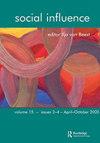心理干预的回旋效应
IF 0.6
3区 心理学
Q3 PSYCHOLOGY, SOCIAL
引用次数: 9
摘要
研究发现,教授人们关于心理偏见的知识有助于消除偏见行为。另一方面,由于人们天生需要保持积极的自我形象,教育人们他们所持有的偏见很可能会导致一种适得其反的效果,因为与某种特定的偏见联系在一起意味着消极的社会内涵。在下面的三个研究中,我们研究了心理偏见暗示负面相关行为的情况,并表明在这些情况下教人们偏见可能会适得其反。本文章由计算机程序翻译,如有差异,请以英文原文为准。
The boomerang effect of psychological interventions
Abstract Research has found that teaching people about psychological biases can help counteract biased behavior. On the other hand, due to the innate need for preservation of a positive self-image, it is likely that teaching people about biases they hold, may cause a boomerang effect in cases where being associated with a specific bias implies negative social connotations. In the three studies below we examine situations in which psychological bias implies negatively associated behavior, and show that teaching people about bias in those contexts can be counterproductive.
求助全文
通过发布文献求助,成功后即可免费获取论文全文。
去求助
来源期刊

Social Influence
PSYCHOLOGY, SOCIAL-
CiteScore
1.50
自引率
0.00%
发文量
4
期刊介绍:
Social Influence is a journal that provides an integrated focus for research into this important, dynamic, and multi-disciplinary field. Topics covered include: conformity, norms, social influence tactics such as norm of reciprocity, authority, scarcity, interpersonal influence, persuasion, power, advertising, mass media effects, political persuasion, propaganda, comparative influence, compliance, minority influence, influence in groups, cultic influence, social movements, social contagions, rumors, resistance to influence, influence across cultures, and the history of influence research.
 求助内容:
求助内容: 应助结果提醒方式:
应助结果提醒方式:


